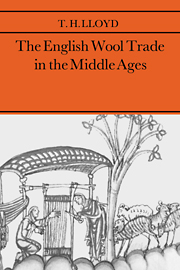Book contents
- Frontmatter
- Contents
- List of Tables and Maps
- Preface
- Abbreviations used in Notes and Bibliography
- 1 The growth of the Flemish connection
- 2 The end of the Flemish ascendancy
- 3 The Italian hegemony
- 4 The English triumphant
- 5 Edward III – woolmonger extraordinary
- 6 Quest for a staple policy
- 7 The evolution of the Calais staple
- 8 The decline of the wool trade
- 9 Marketing the wool
- Notes
- Bibliography
- Index
6 - Quest for a staple policy
Published online by Cambridge University Press: 10 December 2009
- Frontmatter
- Contents
- List of Tables and Maps
- Preface
- Abbreviations used in Notes and Bibliography
- 1 The growth of the Flemish connection
- 2 The end of the Flemish ascendancy
- 3 The Italian hegemony
- 4 The English triumphant
- 5 Edward III – woolmonger extraordinary
- 6 Quest for a staple policy
- 7 The evolution of the Calais staple
- 8 The decline of the wool trade
- 9 Marketing the wool
- Notes
- Bibliography
- Index
Summary
Throughout the winter and spring of 1342–3 the wool trade was in a state of crisis, caused partly by political and partly by monetary factors. Total exports were at a lower ebb than at any time since the beginning of the war. It was inevitable that the matter should be debated in the parliament which was summoned for 26 April 1343 and it was probably for this reason that the government caused an assembly of merchants to come together one day earlier. The writs for the latter body were identical with those sent out in June 1342. The petitions of the merchants were copied onto the dorse of the parliament roll, although presumably they had been presented first in their own assembly. They began by stating that it would be to the greatest profit of the king and his subjects if the staple was held in England, since this not only would enhance the price of wool but would also inhibit the entry of debased coin into the country. Their objection to the present staple in Bruges was twofold. In the first place they protested that the towns of Ghent, Bruges and Ypres, which exercised a corporate dictatorship in Flanders, sought to manipulate the staple for their own profit. This they did by trying to suppress the manufacture of cloth in the smaller Flemish towns and by preventing wool from leaving the staple in sea-going ships, thus hampering the Italians who were important customers.
- Type
- Chapter
- Information
- The English Wool Trade in the Middle Ages , pp. 193 - 224Publisher: Cambridge University PressPrint publication year: 1977



